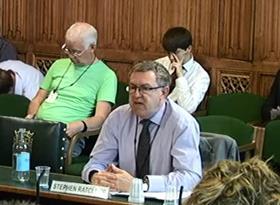Director of contractorsÔÇÖ body Stephen Ratcliffe told by MPs that this evidence to the committee ÔÇśreflects badly on the industryÔÇÖ

The director of the UK ContractorsÔÇÖ Group Stephen Ratcliffe has been told by a parliamentary committee investigating blacklisting that his evidence ÔÇťreflected badlyÔÇŽ on the industryÔÇŁ.
In an hour and a half long session, Ratcliffe was grilled by MPs about his knowledge of blacklisting and the UKCGÔÇÖs reaction to the scandal as part of the committeeÔÇÖs ongoing inquiry into the blacklisting of construction workers.
Two MPs on the Scottish Affairs Committee accused Ratcliffe of being ÔÇťevasiveÔÇŁ during the session, while Simon Reevell MP, a former lawyer, said: ÔÇťYou are the most evasive and potentially dishonest witness IÔÇÖve encountered at this committee and frankly in 20 years of practicing at the bar.ÔÇŁ
Chair Ian Davidson MP said he had spoken to the committee clerk to see what powers it had for potentially reprimanding Ratcliffe ÔÇťin the event that we find any of the answers weÔÇÖve been given are less than the whole truthÔÇŁ.
Davidson said in his summing up: ÔÇťThis has been a session that has reflected very badly on you, on your organisation and indeed on the industryÔÇŁ.
Ratcliffe opened his evidence by reading a statement saying that blacklisting has ÔÇťdamaged the reputation of the entire UK construction sectorÔÇŁ.
He said most of the firms UKCG represents were not involved in blacklisting but said some were.
He added: ÔÇťThese companies have accepted that these actions were morally wrong and have apologised.ÔÇŁ
He said blacklisting had also damaged positive relations between UKCG and the unions.
Chairman Ian Davidson asked Ratcliffe when he learned about blacklisting and Ratcliffe replied when the press first reported it in 2009.
He later said 2009 was also the first time heÔÇÖd heard of The Consulting Association (TCA), which compiled the blacklist.
Davidson reminded him he was under oath, adding: ÔÇťCan you understand why I find that difficult to believe?ÔÇŁ
Ratcliffe said he wasnÔÇÖt trying to mislead the committee, saying: ÔÇťItÔÇÖs not easy to be one against a number of people [the committee]ÔÇŁ.
Ratcliffe was challenged on his initial claim that companies involved in the TCA had ÔÇťapologisedÔÇŁ.
When pressed, he said his basis for saying this was the committee hearings and evidence heÔÇÖd seen from UKCG members, whoÔÇÖd given evidence, coupled with the fact heÔÇÖd emailed his statement to all members in advance of the hearing and none had raised any concerns with it.
Ratcliffe then admitted that only ÔÇťfive or sixÔÇŁ of his 32 members had replied, prompting chair Davidson to question RatcliffeÔÇÖs intial apology on behalf of UKCG members, adding ÔÇťI think this is an attempt to deliberately mislead us.ÔÇŁ
Davidson accused Ratcliffe of ÔÇťnegligenceÔÇŁ over blacklisting for doing ÔÇťvirtually nothing in four years [since TCA came to light in 2009]ÔÇŁ.
Ratcliffe said blacklisting ÔÇťhasnÔÇÖt been on the agendaÔÇŁ of the UKCG in the four years since the TCA blacklist was uncovered.
But when pressed by MPs he revealed the UKCG had had some dialogue with members about blacklisting outside of formal meetings.
He said UKCG had been contacted by the Chartered Institute of Personnel Development (CIPD), which covers the human resources profession, about setting up a ÔÇťcode of practice that might have some teethÔÇŁ for construction HR professionals, with a potential focus on conduct for firms working on public sector contracts.
He said any potential code of practice would be run ÔÇťby a third partyÔÇŁ, like the CIPD, and could have the powers to ÔÇťproperly vet staffÔÇŁ.
He said he had contacted UKCG members about the proposal by email.
He said heÔÇÖd be ÔÇťhappyÔÇŁ to take the proposal of a no fault compensation plan to UKCG members.
Asked if unions ever raised blacklisting with him, such as UniteÔÇÖs former boss George Brumwell, Ratcliffe said: ÔÇťIÔÇÖm pretty sure it didnÔÇÖt happen [ÔÇŽ] If it did I have no recollection of it.ÔÇŁ
Ratcliffe said ÔÇťa lotÔÇŁ of firms had been spending ÔÇťa lot of money putting in compliance practices into businessesÔÇŁ in response to the blacklisting allegations, to ensure the practice did not happen again.
When questioned as to how he knew this, Ratcliffe initially said he had read this in ║├╔ź¤╚╔˙TV magazine, but when questioned further said he was basing this on conversations heÔÇÖd had with the chief executives of Kier, Bam, Balfour Beatty and Sir Robert McAlpine.
Ratcliffe said health and safety had been ÔÇťthe most important issueÔÇŁ for chief executives of its member organisations ÔÇťfor the best part of a decadeÔÇŁ.
But he said evidence uncovered in the past four years suggesting workers raising health and safety concerns had been blacklisted had never come up in meetings.
He said the leadership role in UKCG lay with members rather than him and best practice was derived from members.
He rejected suggestions from MPs that UKCG should monitor or reprimand its members activities, saying ÔÇťIÔÇÖm not a regulator or a policeman of the industryÔÇŁ.
He said the issue of disciplining a member for contravention of UKCG best practice ÔÇô on any issue ÔÇô had ÔÇťnever been discussed in meetingsÔÇŁ.
Asked to justify his ┬ú120,000 salary, Ratcliffe said: ÔÇťYouÔÇÖll have to ask my members thatÔÇŁ.
Ratcliffe disputed that firms were motivated by profit and said he personally ÔÇťwouldnÔÇÖt get out of bed to work in constructionÔÇŽ for 2-3% marginsÔÇŁ.
When asked to clarify the remark, he said: ÔÇťThe point IÔÇÖm trying to make is itÔÇÖs not a massively profitable industry.ÔÇŁ
Asked if he was ÔÇťdoing a PR job on behalf of membersÔÇŁ, he said ÔÇťyesÔÇŁ.




























No comments yet